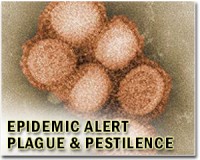| . |  |
. |
Geneva (AFP) June 1, 2010 Scientists advising the World Health Organisation on Tuesday held a meeting to give their latest assessment of swine flu, in a move that could end the pandemic alert, a WHO spokesman said. The UN health agency said the result of the confidential meeting would be announced on Wednesday. Speaking shortly before the teleconference began, WHO spokesman Gregory Haertl said the scientists would be "reviewing the epidemiological situation around the world" and that a "recommendation or announcement one way or the other" would be made. Asked if the emergency committee of scientists could recommend an end to the pandemic declared by the UN health agency nearly a year ago, Haertl said: "They could." "The two most likely outcomes are either the status quo or post-pandemic," he told journalists. WHO Director General Margaret Chan has closely followed the advice of the 15-member emergency committee headed by Australian infectious diseases expert John Mackenzie since swine flu was first uncovered in April 2009. It played a crucial role in recommending an international emergency over the new virus and scaling up different stages of alert, including the declaration of a pandemic on June 11, 2009. The committee declined to wind down the pandemic alert at its last meeting in February after the disease appeared to wane in North America and Europe. Mackenzie said in April that he was waiting to see how A(H1N1) influenza progressed in the southern hemisphere's traditional autumn and winter flu seasons, amid predictions of a second wave. Last Friday, the WHO's weekly pandemic assessment noted that there was "little evidence of pandemic influenza activity in the temperate zone of the southern hemisphere," except for parts of Chile. Haertl told journalists: "Examining what's happening, or has not yet happened, in the southern hemisphere yet will probably be key to their discussions this afternoon (Tuesday)." A(H1N1) influenza has killed more than 18,114 people since the virus was uncovered in Mexico and the United States last year, according to WHO data. It spread swiftly worldwide, prompting the agency to declare a pandemic more than two months later, and has affected some 214 countries and territories. But fears about the severity of swine flu, which sparked a rush for hundreds of millions of dollars worth of specially developed vaccines and a flurry of special public health precautions, petered out in the latter stages of 2009. The UN health agency has responded to criticism of the international alert by setting up an independent committee of experts this year to review the handling of the swine flu pandemic. The review panel is due to issue its conclusions by the beginning of next year.
Share This Article With Planet Earth
Related Links Epidemics on Earth - Bird Flu, HIV/AIDS, Ebola
 Swiss defend swine flu vaccine purchase
Swiss defend swine flu vaccine purchaseGeneva (AFP) May 27, 2010 Swiss authorities on Thursday defended their decision to buy about twice as many doses of vaccines as its population at the beginning of the swine flu pandemic, much of which remained unused. "The purchase of the vaccines in the climate of uncertainty in the beginning of the A(H1N1) flu pandemic was justified, the same could be said for the doses of vaccines purchased," the Federal Interior ... read more |
|
| The content herein, unless otherwise known to be public domain, are Copyright 1995-2010 - SpaceDaily. AFP and UPI Wire Stories are copyright Agence France-Presse and United Press International. ESA Portal Reports are copyright European Space Agency. All NASA sourced material is public domain. Additional copyrights may apply in whole or part to other bona fide parties. Advertising does not imply endorsement,agreement or approval of any opinions, statements or information provided by SpaceDaily on any Web page published or hosted by SpaceDaily. Privacy Statement |